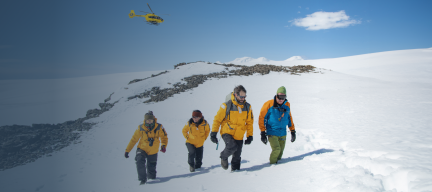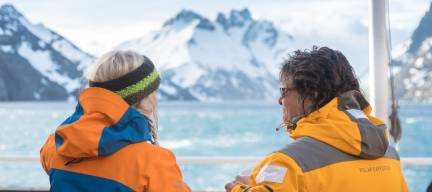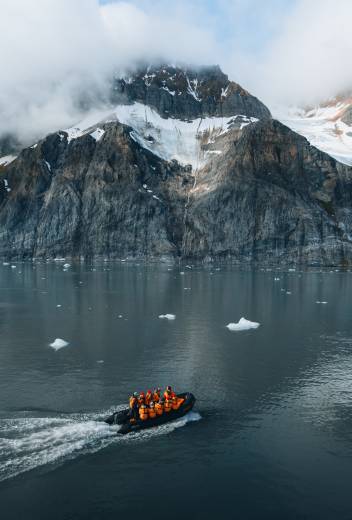This popular post was first published in 2015.
On Somerset Island, in the Canadian province of Nunavut, you’ll find a world-class beluga observation site that becomes home to enormous arctic whale pods each summer. In summer 2014, Arctic Watch Wilderness Lodge welcomed Vancouver Aquarium researcher Dr. Valeria Vergara, who spent four weeks at the lodge on an arctic research project, furthering her in-depth studies of the area’s belugas.
Beluga whales, nicknamed “sea canaries” by early whalers, are one of the most fascinating whales in the Arctic and are amongst the most vocal on the planet. While the distinctive clicks, squawks and whistles of trained belugas are wonderfully entertaining, just imagine the spectacle of hundreds of these magnificent creatures swimming freely in their natural habitat.

Photo credit: Nansen Weber Photography
Vergara, whose PhD dissertation at the University of British Columbia was on acoustic communication and vocal learning in beluga whales, says much of her interest is based on how animals understand and communicate, noting that cetaceans, such as whales and dolphins, have developed complex systems.
“Belugas are particularly loquacious,” Vergara says. “And yet the function of their calls, the development of their extensive repertoires, and the role of vocal learning were really poorly understood.”
Get the Arctic Watch Wilderness Lodge: Adventure and Wildlife at 74°N brochure
Answers led to more questions, and Vergara took her studies from the aquarium to the wild: Hudson Bay, the St. Lawrence River estuary, and now Cunningham Inlet on Somerset Island.

Photo credit: Nansen Weber Photography
Cunningham Inlet a Top Beluga Whale Migration Site
Calling it “a pristine nursery area like few in the world,” Vergara noted that more than 2,000 belugas return each summer to molt, nurse their young and socialize. Arctic whale species migrate in summer to the cooler, less populous waters of the Far North. In summer 2016, a group of University of British Columbia researchers captured stunning aerial footage of a pod of bowhead whales foraging and socializing in the Cumberland Sound, just off the coast of Baffin Island. The team used a drone to watch the whales without being intrusive, and plans to monitor the health of the whale population over time.
Video credit: CBC News
See Belugas & Other Whales in the Wild
Far too many people will only ever experience whales from the dry side of a glass enclosure in an aquarium. There are certainly differences between the captive and wild environments,” Vergara says. “In the wild, you are looking at hundreds of whales, rather than a handful. You are observing them on their terms, on their turf, which is incredibly rewarding!”
“The belugas arrived the day we got there, and I am not talking about one or two. We saw hundreds of belugas dancing and performing for us! It was the most magical, beautiful thing I had ever seen. It was truly miraculous that there would be so many there.” – Jeanne Beker, Arctic Watch Wilderness Lodge guest”
Arctic expedition travel offers a unique and rare opportunity to see whales in the wild. Zodiac cruising the waters around Baffin Island, you’ll want to keep your camera at the ready, since you never know when your activity might intrigue a nearby group of whales. Of course, to see hundreds of belugas frolicking in shallow, pristine waters, you’ll have to head to the Cunningham River estuary, near Arctic Watch Wilderness Lodge.

Want to learn more about planning your own adventure at Arctic Watch Wilderness Lodge?
- Read more Arctic Watch stories from expedition experts and travelers like you
- Get the Arctic Watch Adventure Guide
- Download your free Arctic Watch Wilderness Lodge: Adventure and Wildlife at 74°N brochure








